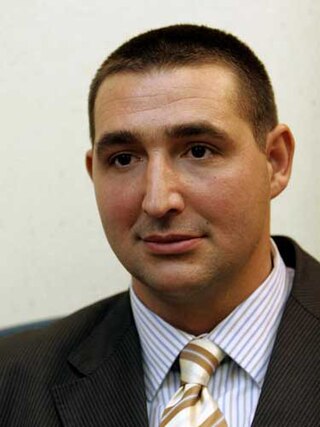Related Research Articles
Bunjevci are a South Slavic sub-ethnic group of Croats living mostly in the Bačka area of northern Serbia and southern Hungary, particularly in Baja and surroundings, in Croatia, and in Bosnia-Herzegovina. They presumably originate from western Herzegovina. As a result of the Ottoman conquest, some of them migrated to Dalmatia, from there to Lika and the Croatian Littoral, and in the 17th century to the Bácska area of Hungary.

The Croatian People's Party – Liberal Democrats is a social-liberal political party in Croatia.
HNS may refer to:
First round of the Vojvodina provincial elections was held on September 19, 2004, at the same time when the local elections were held in the whole of Serbia.

The Alliance of Vojvodina Hungarians is a regionalist political party in Serbia, representing the Hungarian minority in Vojvodina.

The Hungarian Regional Autonomy is the name of a proposed new administrative unit in the northern part of the Autonomous Province of Vojvodina in Serbia.

The Democratic Alliance of Croats in Vojvodina is a political party in Serbia, representing the Croat ethnic minority in the province of Vojvodina.

The Bunjevac dialect, also known as Bunjevac speech, is a Neo-Shtokavian Younger Ikavian dialect of the Serbo-Croatian pluricentric language, preserved among members of the Bunjevac community. Their accent is purely Ikavian, with /i/ for the Common Slavic vowels yat. There are three branches of the Neo-Shtokavian Younger Ikavian dialect: Dalmatian, Danubian, and Littoral-Lika. Its speakers largely use the Latin alphabet and are living in parts of Bosnia and Herzegovina, different parts of Croatia, southern parts of Hungary as well in northern parts of the autonomous province Vojvodina of Serbia. Bunjevac dialect has been included in the list of official public administrative languages of the Subotica Municipality in Serbia since 2021. And Croatia added in 2021 the Bunjevac dialect to the list of protected intangible cultural heritage. Within the Bunjevac community and between Serbia and Croatia is for several decades an ongoing language battle about the status of Bunjevac speech.

Oliver Dulić is a Serbian politician, long-time member of Democratic Party, and former President of the National Assembly of Serbia between 2007 and 2008. He also served as Minister of Environment, Mining and Spatial Planning in the Government of Serbia.

Croats of Serbia are a recognized national minority in Serbia. According to the 2022 census, the population of ethnic Croats in Serbia is 39,107, constituting 0.6% of the total population. The vast majority of them live in the northern autonomous province of Vojvodina, where they number 32,684 and make up 1.9% of the province's population. An additional 11,104 people declared themselves as Bunjevci in the 2022 census; there are differing views whether Bunjevci should be regarded as Croats or as members of a distinct ethnic group.

Croatian Syrmian Initiative was a political party in Serbia representing the Croat ethnic minority in Srem, Vojvodina.

The Restart Coalition was a centre-left political alliance in Croatia. The coalition was formed in 2010 as the Kukuriku Coalition. This somewhat facetious name meaning 'cock-a-doodle-doo', taken from a restaurant of the same name in Kastav where the coalition leaders first convened in July 2009, became well known and was eventually taken as the coalition's official name. The coalition originally consisted of four centrist and centre-left parties in the Croatian Parliament: the Social Democratic Party of Croatia (SDP), Croatian People's Party – Liberal Democrats (HNS-LD), Croatian Party of Pensioners (HSU) and Istrian Democratic Assembly (IDS). The coalition won an absolute majority of seats in the 2011 parliamentary election and successfully formed a government led by Zoran Milanović (SDP).
The Croatian National Assembly is a political organisation of Croat political parties in Bosnia and Herzegovina. The organisation serves as a platform to coordinate political and cultural activities of different parties and stakeholders in the Croatian community and to promote the initiative to create a federal unit with Croatian majority in the country.
Freemasonry in Croatia may be traced to the second half of the 18th century when it was introduced by the officers that came back from the Seven Years' War (1756–1763). However, the fraternity has been repeatedly banned and re-founded since then.
The Croatian Left has consisted of a broad range of individuals, groups, and political parties who seek egalitarian, economic, social and cultural rights in Croatia. Left-wing ideologies came to Croatia in the late 19th century during the Austria-Hungary regime. In 1894, the Social Democratic Party of Croatia and Slavonia was formed. It was the first workers party in Croatia at the time. In the Kingdom of Serbs, Croats and Slovenes the leftist movement grew but it was suppressed by the royal government. In 1920, the Communist Party of Yugoslavia was proclaimed illegal and its sympathizers were brutally persecuted after winning a large number of positions in the local elections. During the 1920s, Stjepan Radić and his Croatian Peasant Party led a centre-left agrarianism and anty-royalist policy. They were the leading Croatian political party at the time. After the assassination of Radić in 1929, the Croatian Peasant Party was taken over by Vlatko Maček who enforced a more conservative and nationalist rhetoric. During the Socialist Yugoslavia era, the League of Communists of Yugoslavia was the only legal party in the country. In 1990, political plurality was restored and a number of left-wing parties emerged with the most notable one being the Social Democratic Party of Croatia.

Tomislav Žigmanov is a Serbian politician serving as minister of human and minority rights and social dialogue since 2022. An ethnic Croat, he has been the president of the Democratic Alliance of Croats in Vojvodina (DSHV) since 2015. He served in the National Assembly of Serbia from 2016 to 2020, and again from 1 August 2022 to 25 October 2022.
Mirko Bajić is a politician in Serbia from the country's Bunjevac community. He has at different times served in the Assembly of the Federal Republic of Yugoslavia, in the Assembly of Vojvodina, and as the deputy mayor of Subotica. He is now a member of the Subotica city assembly. Bajić has been the leader of the Alliance of Bačka Bunjevci since the party's establishment in 2007 and has served for many years on the Bunjevac National Council.
Mirko Ostrogonac is a Serbian politician and agronomy engineer serving as a member of the National Assembly since 26 October 2022. An ethnic Croat, he is a high-ranking member of the Democratic Alliance of Croats in Vojvodina (DSHV).
Together for Vojvodina is a political party in Serbia, representing the Rusyn minority in Vojvodina. It has been led by Olena Papuga since its formation in 2011.
References
- ↑ (in Croatian) Hrvatska riječ Ponovno zajedno, February 16, 2004
- ↑ (in Croatian) DSHV Archived 2008-05-22 at the Wayback Machine Politiziranje sudskih procesa, 17. lipnja 2005.